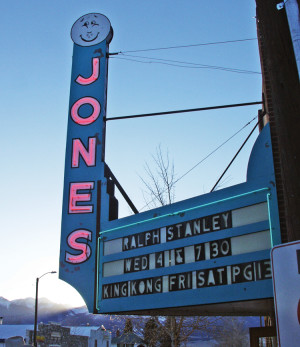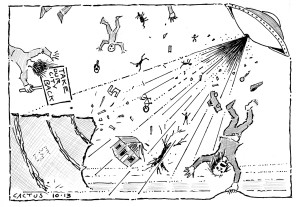By Mike Rosso
Movie theaters have been around in the U.S. since the late 1800s with the invention of the Vitascope projector by Thomas Edison. During the Great Depression, millions of Americans took refuge from economic woes in local theaters. Movie houses were big business for much of the 20th century.
Then came television, allowing families to be visually entertained in their own homes; this put a small dent in theater attendance, but the cinemas were still bringing in big bucks. The video home system (VHS) presented the next challenge to the movie houses, but a delay in the release of the VHS tapes still allowed the theaters to sustain attendance numbers.
Next was the DVD and shorter release dates for new films. The advent of DVD dispensers, such as Redbox, and high-speed internet, which led to Netflix, along with the introduction of large, high-resolution flat-screen televisions made it even easier for folks to enjoy a cinematic experience in their own homes. All of these technologies took their toll on movie houses, especially in small rural areas, where profits are based on the number of seats sold.

But none of these has been a larger threat to the existence of the commercial movie house than the upcoming transition to digital films happening this year. Until now, theaters used film projectors employing a two-reel, 35mm system. The movies are delivered in film “cans” to the theater where they are threaded onto traditional projectors, shown and then shipped off to the next theater.
One of the biggest disadvantages of traditional films is wear and tear. Who hasn’t sat in a theater and watched a film abruptly stop and burn up in front of viewers? Film breakage and deterioration, plus the high cost of shipping, had film producers yearning for a more up-to-date delivery method. Now, with rapid advances in digital technologies, distributors are transitioning to digital projection. Instead of reel-to-reel film cans, films will be shipped on a small hard drive in digital format and projected using digital technologies. It sounds like a forward move for the film industry, but it may lead to the closing of many small, independent movie houses across the U.S. and worldwide, due to the high cost of conversion: approximately $65,000 to $85,000 per screen. Many theater owners are looking to shut down, not having the financial means to upgrade.
Around the central Colorado region, theater owners are using all methods at their disposal to keep the lights on. Some are biting the bullet and purchasing the equipment, others are exploring grants and other creative funding methods.
Buena Vista
The Groy family has been in the theater business in Chaffee County for many years. Lewis Groy owned the Ute Theater in Saguache for some time and then purchased the Unique Theater in Salida, formerly the Salida Opera House, which he operated until his death. His son, John L. Groy, continued to run the theater until the building was condemned by the city in 2007. The theater portion of the building was demolished in 2011.
Lewis’s grandson, John D. Groy, of Buena Vista wanted to keep the family movie tradition alive and last summer reopened the Comanche Drive-In, one of only about 360 drive-ins still operating in the U.S. The theater continues to use equipment dating back to the 1950s: two 35mm projectors using carbon arc light source. Changing or upgrading to digital will require remodeling of the projection booth and installation of new equipment, an investment of $80,000 or more.
Groy is checking into possible grant money and other funding for the upgrade and will continue to run new releases and classic films as long as they are available. The drive-in is open from around Memorial Day through Labor Day and holds around 120 cars. The drive-in recently participated in the Project Drive -In contest by the Honda Motor Company to win new digital equipment, but unfortunately it did not win. Many people voted and the community support was appreciated.
Groy is also considering reopening the historic Pearl Theater on Main Street in Buena Vista. The 100-seat theater has not been open in several years and would require physical upgrades as well as the digital upgrade.
Anyone wishing to donate to the Comanche Drive- In can go to www.comanchedrivein.com and go to the donate page.
Saguache
The Ute Theater in downtown Saguache first opened in the 1930s, according to current owner Christine Gydesen. She purchased the theater in May of 2009, after it had been out of operation for nearly three years. Before that it had only operated on and off for the past thirty years. The new Ute Theater ran feature films until December of 2012, when Gydesen was informed by her film buyer about the coming transition to digital and its expected costs – nearly $85,000. Her buyer noted that by October of 2012, more than 50 of his clients in the western U.S. had closed their doors. Facing the possible closure of her own theater, she hosted a “Farewell to 35mm Night,” splicing together hours’ worth of movie trailers dating back to the 1970s. The handful of people who showed up were invited up to the projection booth and shown the process of threading the film through the theater’s 1930s Peerless Magnarc projector, firing it up possibly for the last time. “I turned on the triple platter system with the micro switch, and flipped the switch which starts the projector, which creates that all-too-familiar clickety-clak of the projector running. Among the group was an eight-year-old boy and I thought, boy, does he have something he can tell his grandchildren …. He witnessed the end of an era,” she said.
Gydesen is determined to keep her theater going and has begun hosting live theater and music as well as the occasional independent film. She also installed a double-deck pizza oven and a wine and espresso bar. She is looking at getting assistance from groups like Downtown Colorado to possibly transition to digital but cannot say what the future holds for the 186-seat Ute Theater.
Cañon City
The Skyline is the last theater standing in the city. Owner Linda Epperson purchased the 98-year-old downtown icon in 2004. Her family also owned the four-screen Creekside Cinema, which closed this past June due to the nearly quarter-million-dollar investment required to convert to digital. The Royal Gorge Theater, formerly located on N. 16th Street, burned to the ground in 2005.
Epperson estimates the cost to convert at $60,000 – cash not easily available for a small business owner. In the spring of 2013, she launched a Kickstarter campaign, trying to raise funds through the online funding website. It allows individuals to donate to the cause in exchange for rewards such as movie passes and on-screen advertising. Then came the devastating fire at the Royal Gorge; donations virtually dried up due to local anxiety about the financial blow to the city’s economy.
In early September, Epperson decided to launch a second Kickstarter campaign, one which will last 45 days with the goal of $35,000.
The Skyline is currently the only commercial movie screen remaining serving the entire Cañon City, Florence and Penrose area, and Epperson is concerned that if it disappears, there will be no theaters left.
“This is no joke,” she said. To help keep the Skyline going, folks are encouraged to visit Kickstarter.com. Tagline: Make Skyline Theater Digital.
The direct link is:
http://www.kickstarter.com/projects/125184386/make-skyline-theater-digital?ref=live
Donations are also being accepted at High Country Bank at 150 North Raynolds Avenue.
Westcliffe
Ann Relph, Executive Director of the Westcliffe Center for the Performing Arts, who operate the Jones Theater, was determined to keep the theater updated and operating. A multi-function venue, the Jones has the financial advantage of belonging to a nonprofit 501(c)(3) and is therefore more likely to receive grant moneys available from organizations such as the Gates Foundation and the Boettcher Foundation. They’ve been working with the Denver Film Society, Downtown Colorado, Inc. (DCI), and the Colorado Small Business Development Center (SBDC), all of whom have been involved in programs to assist theaters in need.
The Jones, which was originally a saloon and pool hall in the 1880s, has been operating 35mm carbon arc projectors from 1928 and hopes to make the switch to digital by the end of the year. They produced several fundraisers this past summer, including “A Taste of History,” and to date have received over 45 individual donations of $100. They are also running a “Diamond in the Sky” fundraiser, where donors’ names will be displayed in the foyer of the theater.
Salida
Since the closing of the Unique Theater in 2007, only two commercial screens remain in Salida – at the Storyville Cinema. Owner Amy Helm, facing up to $135,000 in conversion costs, is “taking it one day at a time” but is discouraged nonetheless. Rising commercial property taxes and the increased costs of doing business have already made it more difficult to run a movie house. Even with grants, she will still have to raise a considerable amount to go digital and would rather invest in upgraded seats and improve the aesthetics of the existing theater.
Helm is concerned that going digital will not likely increase her bottom line; she will still be paying the same percentage to the distributors, and the conversion won’t necessarily bring in more customers. Helm recently attended a conference held in Grand Junction sponsored by the Colorado Office of Economic Development and International Trade (OEDIT), where they announced a Rural Theater Digital Conversion grant. Helm has applied for the grant and is considering turning to the community for assistance, but in the meantime she has listed her theater for sale. Her best hopes for Storyville? “I would like to see Johnny Depp purchase and run the theater,” says Helm, not without a trace of irony.
Lake City
Phillip Virden, original owner of the Mountaineer Theatre in Lake City, thought he was done for in 2010. The 110-seat theater was built in 1975 and closed down from 2010 through 2012 to raise money for the conversion. Without any outreach, the theater still managed to receive nearly $1,000 in donations plus many cards of support. With the help of the SBDC, DCI, Region 10 and Gunnison Savings and Loan, he was able to invest the $100,000 needed for new digital and sound equipment, plus another $25,000 to remodel the concession area and add new seats.
“Our reopening has been an incredible experience – like starting all over. I knew people enjoyed coming to the theatre in the past, but I had no idea what it really meant to our community,” said Virden. “I have had to ‘reinvent’ our business – not only with the digital conversion, but with every aspect of how we do business and market to our customers. Without question, I think a cinema in a community plays a very important part in how a community becomes a community. And for an isolated community like ours, it is a critical way to connect to the world around us.”
Monte Vista
The Vali 3 Theater in Monte Vista has been run by the Kelloff family for 45 years. Initially a single-screen venue, it expanded to an adjacent building in the late 1990s for a total of three screens.
Current owner George Kelloff Jr. doesn’t see the financial benefit in the digital conversion and is not sure what the next move for the theater might be. He feels the film companies have little concern for small-town theaters and prefer to work with the big boys in the cities that recognize a larger profit. Small theaters are usually the last to get distribution of feature films, and the time frame before films are marketed to DVD and outlets such as Netflix is getting shorter and shorter, often leading folks to “wait until it comes out on video.” Updating the three screens at a cost of nearly $150,000 is not going to enable them to get films any sooner, and the cost of maintenance and software upgrades for digital equipment will add another burden to the bottom line.
Kelloff believes if a small community wants to keep its theaters open, it has to support them. The original Vali Theater actually had to close for a few years in the 1960s due to declining attendance, but renewed community support allowed it to reopen.
Kelloff’s father, George Sr., built the Star Drive-In in 1955. The family lived in a building next to the snack bar, and George Sr. got the idea to build a drive-in motel after piping in sound to their living room. In 1964, he opened the Movie Manor Motor Inn and aligned the rooms so that each had a direct view of the screen through a large picture window. This past year, George Jr. bit the bullet and updated the two projectors to digital at a cost of $135,000 in order to put it on the market. In May of 2013 it was purchased by Mike and Sanje Suthar, who continue to operate the unique drive-in/motel combination.
As for the Vali 3, a move is currently afoot by a group of Monte Vista residents to form a non profit entity, the Kelloff Regional Center for the Arts, to take over the theater and possibly reopen it as a performing arts venue, arts center and movie house. Hopefully we’ll be writing about those efforts in a future issue.
Hope for small, rural theaters?
Among several groups statewide attempting to help small theaters in the transition are the Denver Film Society, Downtown Colorado, Inc. and the SBDC.
With a mission to develop opportunities for diverse audiences to discover film through creative, thought-provoking experiences, the Denver Film Society (DFS) has firsthand experience with the costs of digital transition. They operate the Sie FilmCenter in Denver and are also facing the possibility of closing their doors unless they can raise the capital for the transition. In December of 2012, they were approached by the Boettcher Foundation who, hearing about the plight of small, rural theaters, approached DFS to learn more about the problems and what impact non-conversion might have.
Ryan Oestreich, director of Sie FilmCenter, cites about 25 examples of Colorado theaters using direct mailings, crowd-sourcing and Kickstarter to raise money. Others are taking out loans or just planning to shut their doors. The DFS has served as technical and fundraising advisor to many rural nonprofit theaters and has also served as fiscal sponsor for the disbursement of grant funds awarded to certain theaters across the state.
Downtown Colorado, Inc. (DCI) is a nonprofit organization designed to help support small business in Colorado downtowns, commercial districts and town centers by providing a variety of programs, partnerships, events, networking and other resources. Last year, the group sponsored a meeting in Brush, Colorado with the Brush Chamber/Main Street Manager, held with an evening event at the Sands Theater. The theater owner spoke of its history, his love of the movie business, and his concerns about the cost of upgrading equipment and how it may impact small, independent theaters throughout the state, according to Katherine Correll, Executive Director of DCI.
Since then, DCI has been working with the Boettcher Foundation, DFS, Department of Local Affairs (DOLA), El Pomar Foundation, OEDIT, Office of Film, Television and Media (a division of Colorado Creative Industries), students from University of Colorado Denver, the SBDC, and the U.S. Department of Agriculture Rural Development to explore solutions to the new challenges faced by independently owned movie theaters.
Over the spring to summer, grants were secured from Gates and Boettcher, to be provided to nonprofit or publicly-owned theaters working with the DFS. The grants allow for equipment upgrades and installation. As the grants from these organizations are only available to nonprofit entities, OEDIT worked to secure additional funds from the state Economic Development Commission (EDC) to provide grants to public and private theaters that meet their criteria.
In order to qualify for EDC grants, theaters must: be in a rural area; be a viable business that will be able to survive in today’s market; have completed some fundraising; and undergo a review of the technology they plan to purchase to ensure that it is appropriate to their auditorium’s needs. DCI is also working with a number of partners, including Community Funded of Fort Collins, to assist with developing a statewide campaign, Save our Screens, to help theaters raise money through local and statewide channels.
With the January 1 digital distribution date looming, all of the partners are working furiously to determine how much funding each theater needs and to be sure theaters are prepared for the conversion. More info can be found at: www.downtowncoloradoinc.org.
All of these efforts by a variety of organizations emphasize the current dilemma of our local cinemas. They recognize the importance these theaters have to their communities – as a viable business, a meeting place and a public entertainment venue. For many folks, sitting at home watching an iPad with a bowl of microwave popcorn just doesn’t cut it, and once a theater closes its doors, they are unlikely to reopen. Hopefully small town movie theaters won’t soon be riding off into a final sunset.





My grandfather, Alfred DiBella, built, owned and operated The Palace Theater in Syracuse New York. It was built in 1924 by Alfred, a Sicilian immigrant. Today, in 2014, it remains owned and operated by my brother Michael S. Heagerty.
We know we are a dying breed. The days of the stand alone, independtly owned theaters are dying a slow death. Wether it’s the digital conversion issue , property taxes, heating and cooling costs, property insurance or maintenance….it’s a struggle to keep going. We are here today and doing everything in our power to keep our doors open but, we don’t know what next month will bring…
Our next move may be, with the help of social media and site like “Go Fund Me” make a plea to the public.
Any ideas or information please feel free to contact us.
Palaceonjames.com
Thank you,
Eileen Heagerty
Hi Eileen,
Our local theater Storyville in Salida, Colorado, which is mentioned in this article, did an online Kickstarter fundraiser and raised enough to convert both of their screens to digital. (The goal was to convert just one). Here is a link to their Kickstarter page:
https://www.kickstarter.com/projects/1042007560/sos-help-storyville-cinema-convert-to-digital